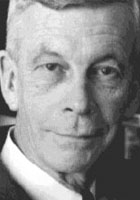Mark Van Doren
Mark Van Doren Poems
After long drought, commotion in the sky;
After dead silence, thunder. Then it comes,
The rain. It slashes leaves, and doubly drums
On tin and shingle; beats and bends awry
...
Listen, The wind is still,
And far away in the night --
See! The uplands fill
With a running light.
...
How far is it to peace, the piper sighed,
The solitary, sweating as he paused.
Asphalt the noon; the ravens, terrified,
Fled carrion thunder that percussion caused.
...
That God should love me is more wonderful
Than that I so imperfectly love him.
My reason is mortality, and dim
Senses; his--oh, insupportable--
...
I wake and hearing it raining.
Were I dead, what would I give
Lazily to lie here,
Like this, and live?
...
The deepest dream is of mad governors,
Down, down we feel it, till the very crust
Of the world cracks, and where there was no dust,
Atoms of ruin rise. Confusion stirs,
...
Love me little, love me long,
Then we neither can be wrong:
You in giving, I in taking;
There is nor a heart breaking
...
Equality is absolute or no.
Nothing between can stand. We are the sons
Of the same sire, or madness breaks and runs
Through the rude world. Ridiculous our woe
...
Whatever I have left unsaid
When I am dead
O'muse forgive me.
You were always there,
...
Mark Van Doren Biography
Nationally famous as a novelist, playwright, critic, editor, and poet (his Collected Poems won the Pulitzer Prize in 1940), at the College Van Doren is also remembered as the quintessential great teacher. In his nearly four decades at Columbia, Van Doren introduced generations to Western literature and became a trusted friend and advisor to students and fellow teachers. Born in Hope, Illinois, Van Doren came to Columbia just as the College was reinventing its curriculum after the war. Van Doren was at the core of the original band of young scholars who taught Erskine's General Honors course in the early 1920s. Years later, as a professor, Van Doren headed a crucial planning committee for Humanities A. Then he not only chaired the program during its formative phase, but continued to teach the course for seventeen years, remarking that it was the most fun he ever had with undergraduates. No less famous were his other courses-on poetry, Shakespeare, and Cervantes. In the 1930s, Van Doren joined his former Columbia colleague Mortimer Adler in establishing the great books program at St. John's College in Annapolis, serving frequently as a visiting lecturer. After his retirement from full-time teaching at Columbia in 1959, Van Doren lectured at Harvard University. To the general public, Van Doren remained a great man of letters from a remarkable literary family. He served as literary editor of the Nation. The author of numerous short stories, novels, and plays, Van Doren was above all a poet and a teacher. As Thomas Merton said in a letter to Van Doren, "You always used your gifts to make people admire and understand poetry and good writing and truth." With Carl Van Doren he wrote American and British Literature since 1890 (1939). He wrote critical studies of various authors, including John Dryden (1920) and Nathaniel Hawthorne (1949), compiled several anthologies, and collected his lectures on poetry in The Noble Voice (1946). As a poet Van Doren was deeply influenced by Wordsworth. Among his volumes of poems are Collected Poems, 1922–1938 (1939; Pulitzer Prize) and Morning Worship and Other Poems (1959). Other writings include novels and a play, The Last Days of Lincoln (1959). He also wrote the influential Liberal Education (1943). See his collected stories (3 vol., 1962–68) and collected poems (1963 and 1969); his autobiography (1958); the memoirs of his wife, Dorothy Graffe Van Doren, The Professor and I (1959).)
The Best Poem Of Mark Van Doren
After Long Drought
After long drought, commotion in the sky;
After dead silence, thunder. Then it comes,
The rain. It slashes leaves, and doubly drums
On tin and shingle; beats and bends awry
The flower heads; puddles dust, and with a sigh
Like love sinks into grasses, where it hums
As bees did once, among chrysanthemums
And asters when the summer thought to die.
The whole world dreamed of this, and has it now.
Nor was the waking easy. The dull root
Is jealous of its death; the sleepy brow
Smiles in its slumber; and a heart can fear
The very flood it longed for, roaring near.
The spirit best remembers being mute.

The astonishing variety of poems in MarkVan Doren's Collected & New Poems, and two later volumes, Morning Worship and Good Morning, the latter introduced by Richard Howard, is staggering in its brilliance and knowledge of the world. A line can be drawn from Dryden and Wordsworth to modern day breakthroughs written long after his Pulitzer Prize volume of 1939.Poetry to him was a form of daily bread, and he has nourished, and will continue to nourish, readers to the end time.